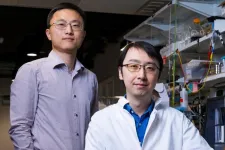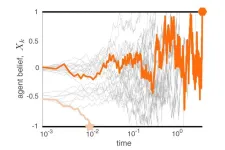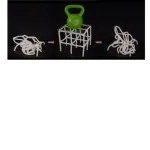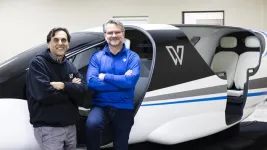(Press-News.org) RICHLAND, Wash.—Last year marked Earth’s warmest year on record. A new study finds that some of 2023’s record warmth, nearly 20 percent, likely came as a result of reduced sulfur emissions from the shipping industry. Much of this warming concentrated over the northern hemisphere.
The work, led by scientists at the Department of Energy’s Pacific Northwest National Laboratory, published today in the journal Geophysical Research Letters.
Regulations put into effect in 2020 by the International Maritime Organization required a roughly 80 percent reduction in the sulfur content of shipping fuel used globally. That reduction meant fewer sulfur aerosols flowed into Earth’s atmosphere.
When ships burn fuel, sulfur dioxide flows into the atmosphere. Energized by sunlight, chemical intermingling in the atmosphere can spur the formation of sulfur aerosols. Sulfur emissions, a form of pollution, can cause acid rain. The change was made to improve air quality around ports.
In addition, water likes to condense on these tiny sulfate particles, ultimately forming linear clouds known as ship tracks, which tend to concentrate along maritime shipping routes. Sulfate can also contribute to forming other clouds after a ship has passed. Because of their brightness, these clouds are uniquely capable of cooling Earth’s surface by reflecting sunlight.
The authors used a machine learning approach to scan over a million satellite images and quantify the declining count of ship tracks, estimating a 25 to 50 percent reduction in visible tracks. Where the cloud count was down, the degree of warming was generally up.
Further work by the authors simulated the effects of the ship aerosols in three climate models and compared the cloud changes to observed cloud and temperature changes since 2020. Roughly half of the potential warming from the shipping emission changes materialized in just four years, according to the new work. In the near future, more warming is likely to follow as the climate response continues unfolding.
Many factors—from oscillating climate patterns to greenhouse gas concentrations—determine global temperature change. The authors note that changes in sulfur emissions aren’t the sole contributor to the record warming of 2023. The magnitude of warming is too significant to be attributed to the emissions change alone, according to their findings.
Due to their cooling properties, some aerosols mask a portion of the warming brought by greenhouse gas emissions. Though aerosols can travel great distances and impose a strong effect on Earth’s climate, they are much shorter-lived than greenhouse gasses.
When atmospheric aerosol concentrations suddenly dwindle, warming can spike. It’s difficult, however, to estimate just how much warming may come as a result. Aerosols are one of the most significant sources of uncertainty in climate projections.
“Cleaning up air quality faster than limiting greenhouse gas emissions may be accelerating climate change,” said Earth scientist Andrew Gettelman, who led the new work.
“As the world rapidly decarbonizes and dials down all anthropogenic emissions, sulfur included, it will become increasingly important to understand just what the magnitude of the climate response could be. Some changes could come quite quickly.”
The work also illustrates that real-world changes in temperature may result from changing ocean clouds, either incidentally with sulfur associated with ship exhaust, or with a deliberate climate intervention by adding aerosols back over the ocean. But lots of uncertainties remain. Better access to ship position and detailed emissions data, along with modeling that better captures potential feedback from the ocean, could help strengthen our understanding.
In addition to Gettelman, Earth scientist Matthew Christensen is also a PNNL author of the work. This work was funded in part by the National Oceanic and Atmospheric Administration.
END
Ships now spew less sulfur, but warming has sped up
Shipping emissions regulations enacted in 2020 improved air quality but accelerated warming, with more to follow in the near future
2024-08-13
ELSE PRESS RELEASES FROM THIS DATE:
Rice-built reactor yields green ammonia and purified water
2024-08-13
HOUSTON – (Aug. 12, 2024) – Ammonia plays a critical role in sustaining food production for the world’s growing population, but making it accounts for about 2% of global energy consumption and 1.4% of carbon dioxide emissions. Rice University engineers have developed a revolutionary reactor design that could decarbonize ammonia production while also mitigating water pollution.
In a study published in Nature Catalysis, a team of Rice engineers led by Haotian Wang described the development of a new reactor system that converts nitrates — common pollutants found in industrial wastewater and ...
Think fast — or not: FSU research describes mathematics behind decision making
2024-08-13
New research from a Florida State University professor and colleagues explains the mathematics behind how initial predispositions and additional information affect decision making.
The research team’s findings show that when decision makers quickly come to a conclusion, the decision is more influenced by their initial bias, or a tendency to err on the side of one of the choices presented. If decision makers wait to gather more information, the slower decision will be less biased. The work was published today in Physical Review E.
“The basic result might ...
Largest study of its kind finds common lab tests aren’t reliable for diagnosing Long COVID
2024-08-13
A new study found that most routine laboratory tests are not reliable for diagnosing Long COVID, also known as Post-Acute Sequelae of SARS-CoV-2 infection (PASC).
The study, published today in Annals of Internal Medicine, found no reliable biomarker among 25 routine clinical laboratory values for prior infection, PASC or specific types of PASC clusters. This suggests none of these routine labs can serve as a clinically useful biomarker of PASC.
"Our study shows patients can have severe Long COVID with normal lab results. This ...
Engineers make tunable, shape-changing metamaterial inspired by vintage toys
2024-08-12
Common push puppet toys in the shapes of animals and popular figures can move or collapse with the push of a button at the bottom of the toys’ base. Now, a team of UCLA engineers has created a new class of tunable dynamic material that mimics the inner workings of push puppets, with applications for soft robotics, reconfigurable architectures and space engineering.
Inside a push puppet, there are connecting cords that, when pulled taught, will make the toy stand stiff. But by loosening these cords, the “limbs” of the toy will go limp. Using the same cord tension-based principle that controls a puppet, researchers have developed a new type of metamaterial, a material ...
Start-up Whisper Aero uses the ORNL Summit supercomputer to test concepts for an ultraquiet electric airplane
2024-08-12
From a nondescript industrial building in the small town of Crossville, Tennessee, the team of engineers at Whisper Aero is planning a revolution in aviation technology.
Previously home to a publisher of magazines — including, coincidentally, Trade-A-Plane, an airplane sales publication started in 1937 — the long-empty property’s cavernous spaces are now filled with multidisciplinary activities that include the creation of a new electric aircraft engine.
In January 2024, employees of the 3-year-old start-up moved into their new headquarters, refurbishing its dusty rooms into a 21st century aerospace technology facility with areas ...
New study unveils 16,000 years of climate history in the tropical Andes
2024-08-12
PROVIDENCE, R.I. [Brown University] — A new study that explores ancient temperatures and rainfall patterns in the tropical Andes of South America has revealed how 16,000 years of climate history in this part of the world was driven by carbon dioxide levels and ocean currents from global climate events.
Led by Brown University researchers, the study marks the first high-resolution temperature record covering the past 16,000 years in the tropical Andes and could help scientists predict and mitigate future climate impacts in tropical regions of the planet. The work is described in the Proceedings of the National Academy of Science.
“Usually ...
The Society of Huntsman Translational Scholars welcomes two more members
2024-08-12
Huntsman Cancer Institute and the University of Utah (the U) are proud to announce the induction of two physician-scientists, Heloisa Soares, MD, PhD, and Skyler Johnson, MD, as members of The Society of Huntsman Translational Scholars.
The Society of Huntsman Translational Scholars supports scientists who focus on translating research discoveries made in the lab into innovations that improve outcomes for cancer patients. Scholars receive financial support for their scientific work, have opportunities for mentorship, and collaborate with other society members in advancing scientific discoveries.
“The Society of Huntsman Translational Scholars ...
UMass Amherst researchers create new method for orchestrating successful collaboration among robots
2024-08-12
AMHERST, Mass. – New research from the University of Massachusetts Amherst shows that programming robots to create their own teams and voluntarily wait for their teammates results in faster task completion, with the potential to improve manufacturing, agriculture and warehouse automation. This research was recognized as a finalist for Best Paper Award on Multi-Robot Systems at the IEEE International Conference on Robotics and Automation 2024.
“There’s a long history of debate on whether we want to build a single, powerful humanoid robot that can do all ...
Co-mentors announced in unique opportunity for PCCM fellows
2024-08-12
Glenview, Illinois – For the second year of the APCCMPD and CHEST Medical Educator Scholar Diversity Fellowship, Tristan Huie, MD, FCCP, and Anna Neumeier, MD, will be co-mentors for 2025.
Designed to pair a fellow-in-training with an established medical educator, the unique scholarship was launched in August 2023 by the American College of Chest Physicians (CHEST) and the Association of Pulmonary and Critical Care Medicine Program Directors (APCCMPD) to improve diversity in respiratory care.
The program focuses on creating opportunities for fellows at institutions ...
AI poses no existential threat to humanity – new study finds
2024-08-12
ChatGPT and other large language models (LLMs) cannot learn independently or acquire new skills, meaning they pose no existential threat to humanity, according to new research from the University of Bath and the Technical University of Darmstadt in Germany.
The study, published today as part of the proceedings of the 62nd Annual Meeting of the Association for Computational Linguistics (ACL 2024) – the premier international conference in natural language processing – reveals that LLMs have a superficial ability to follow instructions and excel at proficiency in language, ...
LAST 30 PRESS RELEASES:
How much sleep do teens get? Six-seven hours.
Patients regain weight rapidly after stopping weight loss drugs – but still keep off a quarter of weight lost
GLP-1 diabetes drugs linked to reduced risk of addiction and substance-related death
Councils face industry legal threats for campaigns warning against wood burning stoves
GLP-1 medications get at the heart of addiction: study
Global trauma study highlights shared learning as interest in whole blood resurges
Almost a third of Gen Z men agree a wife should obey her husband
Trapping light on thermal photodetectors shatters speed records
New review highlights the future of tubular solid oxide fuel cells for clean energy systems
Pig farm ammonia pollution may indirectly accelerate climate warming, new study finds
Modified biochar helps compost retain nitrogen and build richer soil organic matter
First gene regulation clinical trials for epilepsy show promising results
Life-changing drug identified for children with rare epilepsy
Husker researchers collaborate to explore fear of spiders
Mayo Clinic researchers discover hidden brain map that may improve epilepsy care
NYCST announces Round 2 Awards for space technology projects
How the Dobbs decision and abortion restrictions changed where medical students apply to residency programs
Microwave frying can help lower oil content for healthier French fries
In MS, wearable sensors may help identify people at risk of worsening disability
Study: Football associated with nearly one in five brain injuries in youth sports
Machine-learning immune-system analysis study may hold clues to personalized medicine
A promising potential therapeutic strategy for Rett syndrome
How time changes impact public sentiment in the U.S.
Analysis of charred food in pot reveals that prehistoric Europeans had surprisingly complex cuisines
As a whole, LGB+ workers in the NHS do not experience pay gaps compared to their heterosexual colleagues
How cocaine rewires the brain to drive relapse
Mosquito monitoring through sound - implications for AI species recognition
UCLA researchers engineer CAR-T cells to target hard-to-treat solid tumors
New study reveals asynchronous land–ocean responses to ancient ocean anoxia
Ctenophore research points to earlier origins of brain-like structures
[Press-News.org] Ships now spew less sulfur, but warming has sped upShipping emissions regulations enacted in 2020 improved air quality but accelerated warming, with more to follow in the near future




